Jon Akutagawa
 Jon Akutagawa is a graduate student pursuing a doctorate in Biomolecular Engineering and Bioinformatics. After completing his undergraduate degree, Jon worked in an oncology lab for a few years, developing new treatment regimens for rare pediatric leukemias. The positive experiences there fueled his decision to further his education. His current research focuses on developing computational methods to detect novel mutations associated with lung cancer development. His professional goal is to become an independent investigator, researching cancer genomics in an academic setting and mentoring students from underrepresented backgrounds to become the next generation of scientists. As a proud father of a very gregarious toddler, Jon will use the scholarship for childcare costs.
Jon Akutagawa is a graduate student pursuing a doctorate in Biomolecular Engineering and Bioinformatics. After completing his undergraduate degree, Jon worked in an oncology lab for a few years, developing new treatment regimens for rare pediatric leukemias. The positive experiences there fueled his decision to further his education. His current research focuses on developing computational methods to detect novel mutations associated with lung cancer development. His professional goal is to become an independent investigator, researching cancer genomics in an academic setting and mentoring students from underrepresented backgrounds to become the next generation of scientists. As a proud father of a very gregarious toddler, Jon will use the scholarship for childcare costs.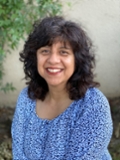
Oralia Alamillo
Just over four years ago, Oralia Alamillo had a drastically different view of what life would be for her today. She never imagined she would be facing the death of her father and a divorcewhich would accompany an “empty nest” within a year. She returned to UCSC to complete her Bachelor of Arts degree in Language Studies, and with plans to teach, she decided to apply to the Master of Arts in Education/Credential Program. Getting accepted into the program meant moving back to Santa Cruz once again and encountering new challenges. Oralia has never lost sight of the final outcome since being a teacher was always something she wanted to do. One of the challenges she has faced since returning to complete her BA has been a financial one, and receiving the Re-entry scholarship from the UCSC Women’s Club means not having to worry about the tuition fees for the final session of the program. It means not having to take out a loan and being able to concentrate on finishing the program and preparing for the next school year as a teacher. For this, Oralia is beyond grateful.
Anne Beulke
Anne Beulke is a second year Ocean Science PhD student. Her research focuses on conservation genetics of salmon and steelhead. She is using genetics to provide insights on these species that could improve fishery management strategies. Before she started graduate school, she worked for the Forest Service in Alaska, Washington, and California. The funds from this scholarship will be used to purchase an iPad and Apple Pencil. Having the tablet will improve her organization, communication capabilities, and mobility—especially during this time of social distancing. The mobility of the tablet also makes it more versatile than a laptop. Anne thanks all of the Women's Club members for their contributions to the scholarship.
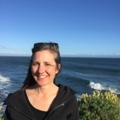
Wendy Bragg
Wendy Bragg is a Ph.D. student advised by Dr. Pete Raimondi in Ecology and Evolutionary Biology with a designated emphasis in Coastal Science & Policy (CSP). Her interests are focused on studying intertidal ecosystems to determine the underlying drivers of organismal responses to environmental changes. In particular, she plans to address how environmental stressors impact marine disease ecology and how management decisions influence both the spread and recovery processes. Ideally, her research will help inform management and restoration efforts of marine protected areas. The generous funding by the UCSC Women’s Club and the Marilyn C. Davis Foundation will be used to defray expenses for a summer field course at Friday Harbor Labs on Marine Conservation Ecology. In the event that this course is cancelled due to Covid-19, the funds will help cover summer travel to sites within California for exploratory research.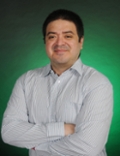
Brandon Castro
Brandon Castro is an undergraduate at UCSC studying Film and Digital Media. Brandon has wanted to attend and graduate college ever since being adopted at age six. The Women's Club Scholarship will help Brandon attend a conference in the summer at UCLA. Brandon's long-term goal is to hopefully teach in the field. Brandon also hopes to create a scholarship fund to help former foster youth pursuing higher education.
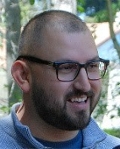
Oscar M. Cazares
Oscar M. Cazares is a first-generation, LGBTQ, Ph.D. candidate in the Department of Molecular, Cell, and Developmental Biology. Oscar’s thesis work focuses on understanding how the mammary gland, or breast, generate the millions of milk-producing cells needed with each pregnancy. Oscar hopes his research may offer a therapeutic solution for milk-insufficiency syndrome, impacting many women’s/children’s health worldwide. In addition to research, Oscar actively volunteers at UCSC by mentoring underrepresented minority students and non-traditional students in STEM. Oscar’s long-term goal is to become a professor at a research-intensive university and to continue bridging the educational gaps affecting thousands of underrepresented students and non-traditional students in higher education. Oscar will use his STARS re-entry scholarship to cover the cost of an ergonomic chair and software needed for his thesis work.
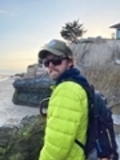
Charles Martin
Charlie moved from North Carolina to California in 2013 to study water quality in San Francisco Bay at the US Geological Survey. In 2018, he began his PhD studies at UC Santa Cruz with Dr. Rapheal Kudela. Charlie is interested in phytoplankton community composition and specifically harmful algal blooms that can impact fisheries and public health. At UCSC, Charlie is developing workflows for "no-code" machine learning algorithms that in conjunction with automated phytoplankton imaging technologies, can increase accessibility for state and local managers to near real-time data on phytoplankton community composition in Monterey Bay. The STARS re-entry scholarship from the UCSC Women's Club will be used to make Charlie's home "office" more productive and a more ergonomic working environment. Charlie is extremely grateful for the support and excited to see what's to come next in the adventure of earning a PhD.
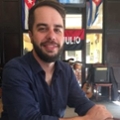
Andrew Meyer
Andrew Meyer is a PhD candidate in Politics at the University of California, Santa Cruz. He holds a master's degree with distinction in Middle East and Islamic Studies from the University of Exeter and is also a former research assistant at the Encyclopedia of Women and Islamic Cultures. His doctoral research centers on settler colonial theory and the potential for decolonization in relation to the question of Palestine. The generous scholarship from the UCSC Women's Club will allow Andrew to replace his decade-old, broken down laptop, which is imperative for his intense research and writing schedule. The new computer will also allow Andrew to carry out the fieldwork component of his dissertation project – to be completed after the passing of the COVID-19 crisis – and keep him on track for his anticipated dissertation submission in the summer of 2021.

Fatyma Camacho Peralta
Fatyma Camacho Peralta is 30 years old and currently enrolled in the Games and Playable Media graduate program. Since she was a little girl, video games have been an important part of her life as a tool for entertainment, learning and imagination. She believes video games create powerful experiences that captivate people in a way that no other media is capable. They are instruments to make people feel and be empathetic, make decisions and be themselves in a safe environment. She wishes more than anything to be part of this industry, contributing to make more people feel connected to something bigger the same way they make her feel. As a Latina woman in the game industry and first GPM Latina graduate student, Fatyma understands the big obstacles and expectations that she has to conquer. This scholarship means a lot to her and her family. It will help them mitigate some of the economical hardships they are facing today by paying part of her tuition. Fatyma sincerely appreciates the committee and the Women’s Club for their consideration in her application and she is humbled to connect you with her story.
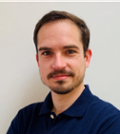
Alejandro Rodriguez Foley
Alejandro Rodriguez Foley obtained his B.S. in Chemistry at University of Sevilla (Spain). As an undergraduate and predoctoral student, he received training in organic synthesis from Prof. Dr. Alain Burger (Université de Nice Sophia Antipolis) Prof. Dr. J. Enrique Oltra (University of Granada), and Dr. Kirk Gustafson (NIH-NCI). Alejandro is currently a PhD candidate in the Chemistry & Biochemistry Department at the University of California, Santa Cruz in the laboratory of Prof. Dr. Jevgenij Raskatov. His research lies at the interface of chemistry and biology, specifically focused on studying amyloid β aggregation and neurotoxicity through biochemical, biophysical, and biological approaches. The STARS Scholarship will help Alejandro buy a new laptop that will be useful for processing the complex datasets that he generates on his research projects.
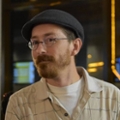
Daniel Rudin
Daniel Rudin is a Ph.D. candidate in Film & Digital Media, having returned to academia after spending two years working as a multimedia journalist and labor organizer. His purpose is to advance the disciplines of film studies and documentary filmmaking and to teach at the university level. His research involves both theory and film praxis and focuses on the New Philippine Cinema—a generation of films associated with the 1986 People Power Revolution. His long-term goal is to engage in scholarly dialogue in this field, to publish, and to continue producing digital media documentaries. The Stars Re-entry Scholarship will allow him to shift from writing to the digital media component of his dissertation during summer 2020.
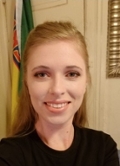
Breanna Sisson
Breanna Sisson is an undergraduate student over the age of 25, studying full-time to earn a B.S. in Biochemistry and Molecular Biology. Her career goal is to become a licensed Clinical Genetic Molecular Biologist Scientist (CGMBS) and to work in research and development for a biotechnology company or to perform specialized diagnostic tests in a hospital or commercial laboratory. Breanna will use this award to pay for books, lab fees and educational supplies as well as for CGMBS post-baccalaureate training program and licensing application fees before she graduates. Breanna is immensely grateful to the UCSC Women’s Club for their generosity. The award will greatly reduce the financial burden and stress of her final year of study.
Christine Spaugh
Christine Spaugh is an undergraduate student finishing up a History major and will be graduating with honors this past spring. She has recently been admitted to UCSC’s Masters in Education and Multiple-Subject teaching credential program and is closer to fulfilling her lifelong goal of becoming the teacher she’s always wanted to be. She is a third generation Santa Cruz county native, full-time mother of two wonderful children, student, and active volunteer in the Bradley Elementary School community in Corralitos. Having had two children at a very young age, she had to put her own education and career goals of becoming an educator on hold in order to support her family the way they deserved to be supported and cared for. After waiting a long eleven years, she is ecstatic that all of her hard work and perseverance has paid off, and is now within reach of obtaining her academic and career life goals. Christine would like to sincerely thank the Women’s Club for the tremendous honor! She will use the scholarship to pay toward her upcoming tuition and school supplies.

Stephanie Webb
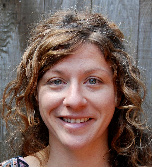 Stephanie is a returning, non-traditional, 38 year old PhD candidate (and mother) in Environmental Studies at the University of California, Santa Cruz. She uses 1) political ecology, 2) commodity chain governance, and 3) food science theories to explore the interplays between fisheries management, commerce, and technology in food systems. She uses the Pacific herring fishery in California as a case study to examine seafood security, small scale fishers' (in)equity, and resource sustainability in the “forage fish paradox,” where millions of pounds of seafood are being harvested, but rarely available for direct human consumption. Stephanie will use the STARS award to help her pay for childcare and purchase a new computer, both necessary to graduate within her department's 5-year normative time frame. She’d like to extend her gratitude to the Women's Club for reducing the financial obstacles that accompany trying to complete a dissertation and raise her 12-month old son simultaneously.
Stephanie is a returning, non-traditional, 38 year old PhD candidate (and mother) in Environmental Studies at the University of California, Santa Cruz. She uses 1) political ecology, 2) commodity chain governance, and 3) food science theories to explore the interplays between fisheries management, commerce, and technology in food systems. She uses the Pacific herring fishery in California as a case study to examine seafood security, small scale fishers' (in)equity, and resource sustainability in the “forage fish paradox,” where millions of pounds of seafood are being harvested, but rarely available for direct human consumption. Stephanie will use the STARS award to help her pay for childcare and purchase a new computer, both necessary to graduate within her department's 5-year normative time frame. She’d like to extend her gratitude to the Women's Club for reducing the financial obstacles that accompany trying to complete a dissertation and raise her 12-month old son simultaneously.
